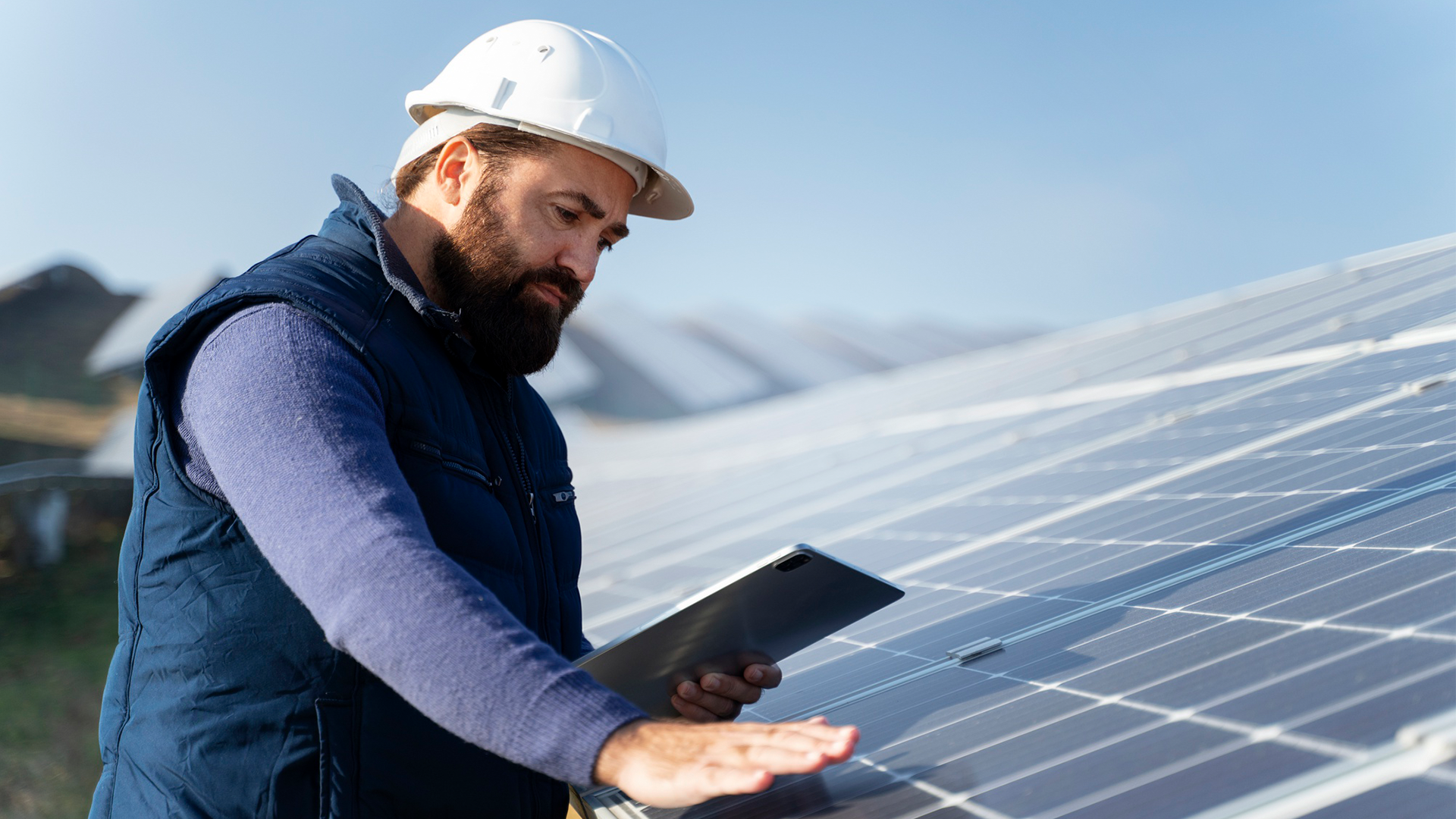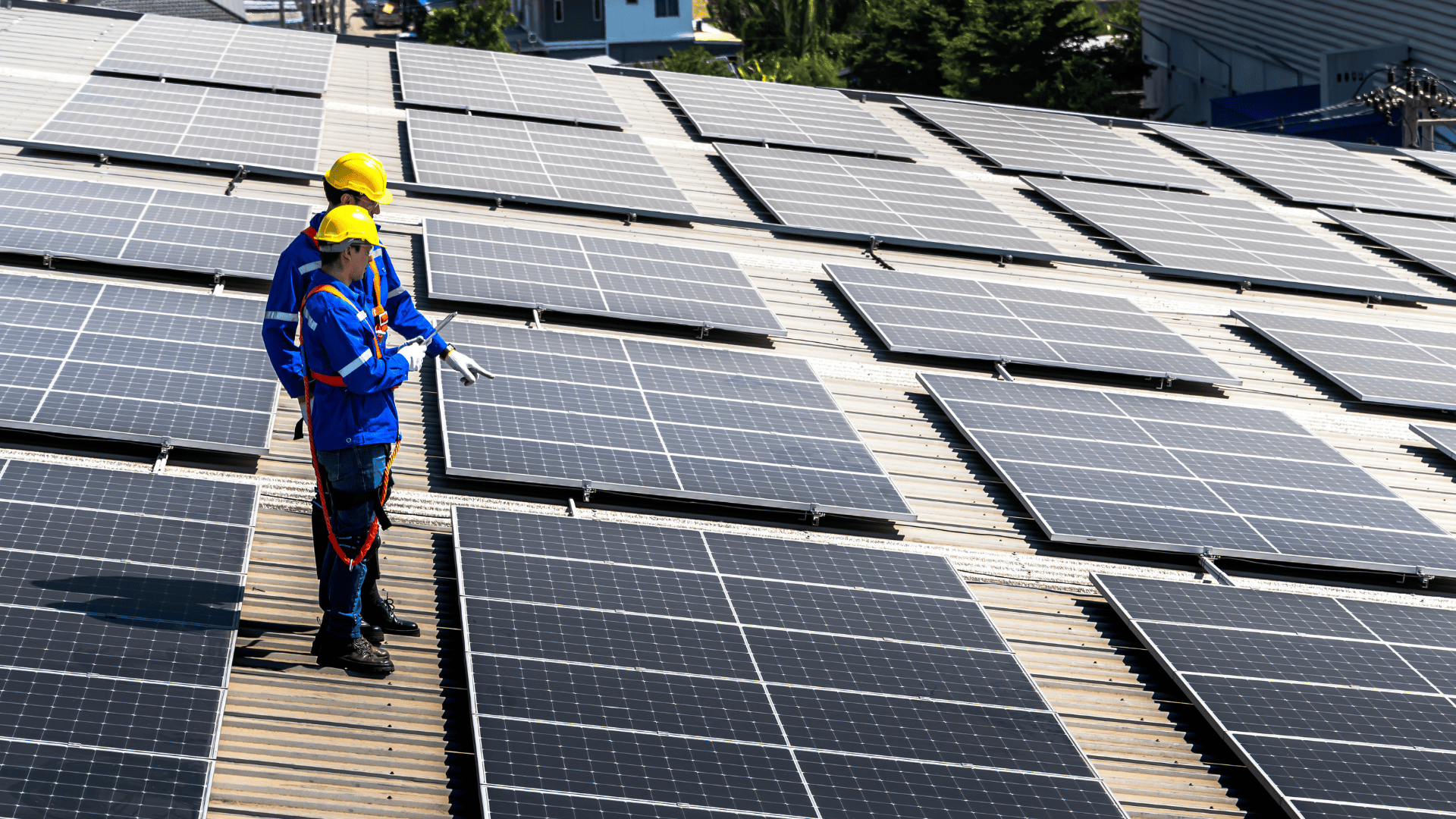January 7, 2025
Solar Energy Ireland
As we approach 2025, Ireland is accelerating its journey toward a renewable energy revolution, with solar power emerging as a key instrument. The country is known for its temperate oceanic climate and frequent cloudy skies.
Its weather patterns have historically hampered the adoption of solar energy. However, technological advancements and innovative strategies to harness even the dimmest sunlight are reshaping the narrative.
This blog delves into the impact of changing weather trends and emerging innovations around Ireland's solar energy capacity. From the Climate Action Plan (CAP) and updated policy frameworks to enhanced solar energy efficiencies and solutions, it will explore what these changes mean for solar professionals.
It will also discuss how they can overcome challenges to thrive in the evolving solar energy market. Stay tuned to gain valuable insights into Ireland's solar prospects.
Key Takeaways
Here are the key takeaways from the blog:
- Solar Energy Ireland is on a journey toward renewable energy and a sustainable future. Its solar PV systems help generate electricity from sunlight.
- Solar electricity generated in Ireland has seen remarkable growth, highlighting the expanding contribution of solar photovoltaics to the country’s energy grid.
- With supportive government policies and ongoing technological advancements, installing solar panels is becoming increasingly common across the country.
- Solar systems in Ireland face weather challenges and policy issues. However, these challenges can be mitigated with efficient strategies. If the right actions are taken, the future of solar power in Ireland is bright.
The State of Solar Energy in Ireland
Let’s take a closer look at the current solar power landscape of Ireland:
1. Enhanced Solar Capacity:
According to the Irish Solar Energy Association's (ISEA) Scale of Solar 2024 Report, Ireland has observed a 42.6% increase in solar energy production, reaching 1,185 MW. This growth is driven by energy generated from large solar farms, mini projects, industrial initiatives, and residential installations.
2. Irish Government's Targets:
Ireland aims to achieve 8 GW of solar capacity by 2030, with a substantial portion expected to come from rooftop installations.
3. Policy Support:
- The Irish government has implemented various policies to promote solar energy. The Micro-Generation Support Scheme (MSS) provides grants for solar PV installations up to 50 kW, enabling excess electricity to be sold back to the grid.
- The Small-scale Renewable Electricity Support Scheme (SRESS) offers fixed tariffs for community projects above 50 kW and up to 6 MW.
- The Renewable Electricity Support Scheme (RESS) promotes onshore renewable projects through auctions.
- The National Smart Metering Programme aims to install over 2.1 million smart meters by 2025 for a more flexible grid.
4. Technological Advancements:
Innovations in solar technology and energy storage solutions are enhancing efficiency and helping to tackle weather-related challenges.
5. Environmental Impact:
Solar energy projects are instrumental in reducing carbon emissions and supporting Ireland's climate goals.
Go Through: How Sunbase Optimizes Solar Installation to Meet Peak Demand Times
Impact of weather shifts on Solar Power in Ireland
Ireland experiences mild and moist conditions year-round because of its proximity to the Atlantic Ocean.
The country's weather patterns are marked by frequent cloud cover, plentiful rainfall, and sudden, unpredictable weather changes.
- Cloud Cover: Frequent cloud cover reduces the amount of sunlight available for solar panels. It impacts the efficiency and energy output of solar installations.
- Rainfall: High rainfall can lead to dirt and debris accumulation on solar panels. This blocks sunlight from getting entrapped by the panels, reducing their efficiency.
- Seasonal Variability: Shorter daylight hours during winter months result in lower solar energy production than longer summer days.
- Temperature Effects: While moderate temperatures are generally favorable for solar panel efficiency, extreme weather conditions such as heavy rain and strong winds affect the durability and maintenance of solar projects.
Must Read: Climate Impact on Solar Panels: How Sunbase Solar Solutions Enhances Durability
Opportunities for Solar Professionals in 2025
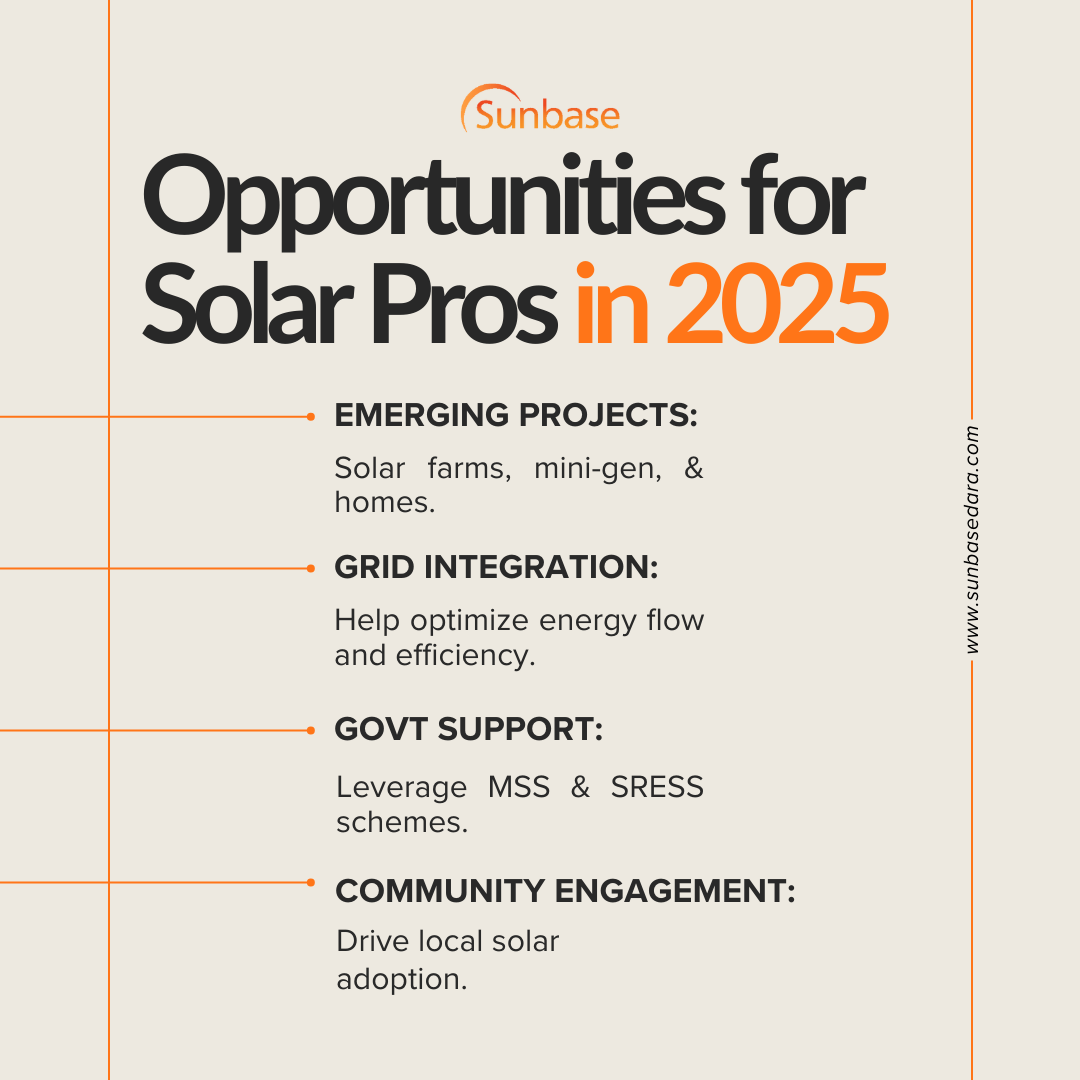
The solar industry in Ireland is on the rise, creating numerous opportunities for solar professionals. Here are the key areas where they can excel in 2025:
1. Emerging Solar Projects:
With Ireland's target of 8 GW of solar capacity by 2030, there will be numerous large-scale solar farms, mini-generation projects, and residential installations. This will open doors for professionals to work on diverse and ambitious ventures.
As the solar industry expands, there will be a growing need for skilled workers in solar panel installation, maintenance, and predictive weather analytics.
2. Grid Integration:
Grid integration in Ireland strives to accommodate increasing solar capacity. It is crucial and helps to ensure a smooth and efficient energy supply. Solar professionals can contribute to grid integration projects.
3. Government Assistance:
The government of Ireland has introduced policies like the Micro-Generation Support Scheme (MSS) and the Small-scale Renewable Electricity Support Scheme (SRESS) to provide grants and fixed tariffs for solar projects.
Professionals can leverage these incentives to develop and manage solar panel installations that align with national energy goals.
4. Community Engagement:
The renewable energy targets of Ireland provide solar professionals with opportunities to connect with
potential clients who are motivated to adopt sustainable solutions. It can significantly increase the probability of converting potential customers into actual ones.
Engaging with local communities to promote solar energy adoption and develop community-based projects can create new opportunities for professionals. This includes working with homeowners, businesses, and local authorities to implement solar solutions.
This approach creates opportunities for collaboration and fosters public support for renewable energy initiatives.
Worth Reading: 10 Tips for Solar Professionals to Succeed in 2025
Challenges and Mitigation Strategies
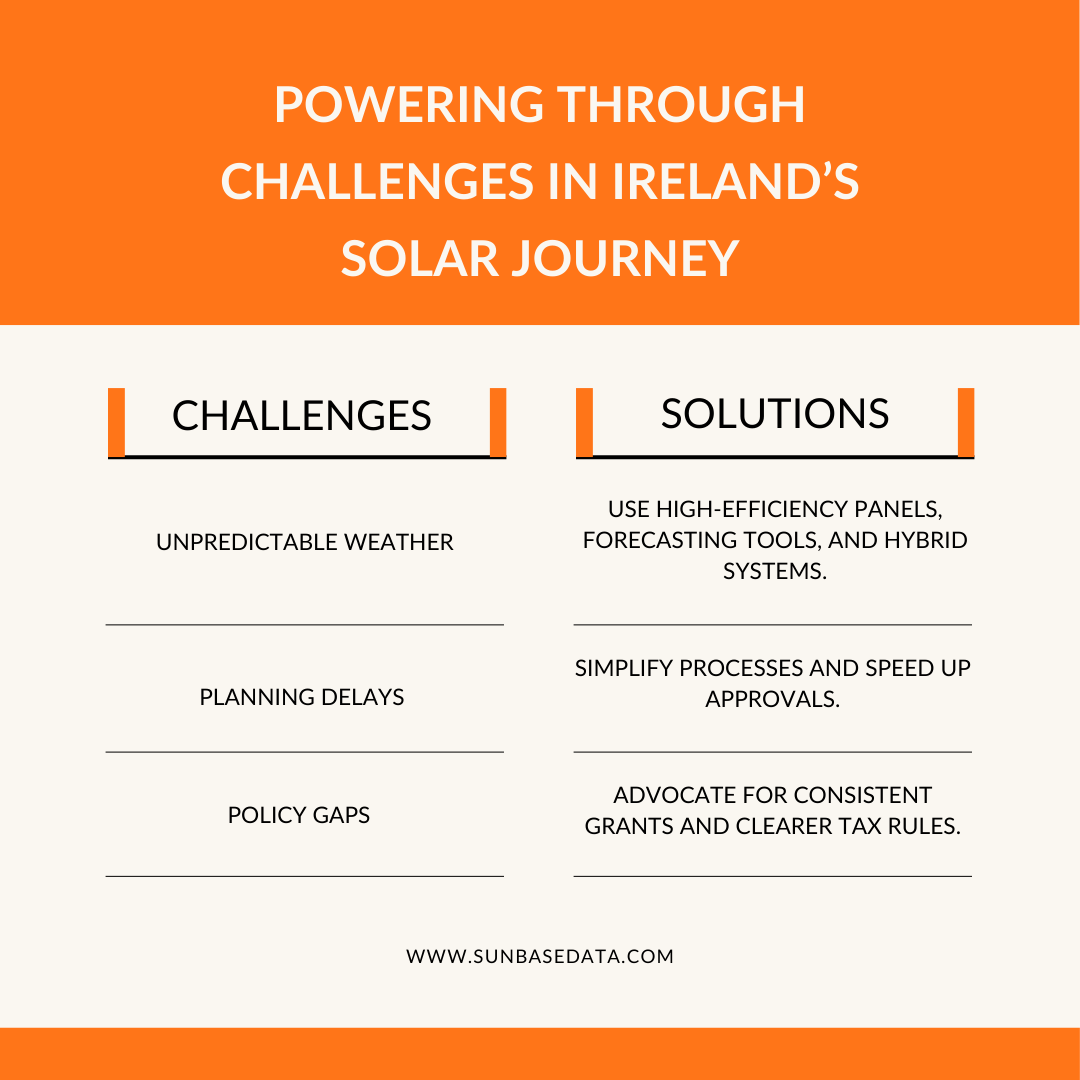
While Ireland's solar industry is brimming with opportunities, it also faces its fair share of challenges.
However, solar professionals can overcome these hurdles with the right strategies and help drive the industry forward. Here are some of the challenges and strategies to address them.
1. Unpredictable Weather:
Ireland's variable weather conditions, including prolonged overcast, can negatively impact solar energy
production.
Mitigation strategies include investing in high-efficiency solar panels that can capture even the sunlight scattered by clouds, implementing advanced weather forecasting tools, regular maintenance of solar panels, optimal panel placement, and hybrid systems (combining solar panels with wind power) to access a more stable energy supply.
2. Planning and Permitting:
The National Planning Authority often struggles to resolve solar planning appeals within the required 18 weeks. In many cases, decisions take longer. These delays in planning and permitting can slow down the project pace and create uncertainty.
Simplifying these processes and ensuring quicker decisions can help address this issue. It will keep solar projects on track.
3. Policy Inconsistencies:
The gradual reduction in grant support for rooftop solar PV systems under the Micro-Generation Support Scheme (MSS) has become a significant obstacle.
Farmers also get confused about environmental taxes, with the conditions attached to Capital Acquisitions Tax (CAT), Agricultural Relief, and Capital Gains Tax (CGT) Retirement Relief.
These tax issues discourage farmers from offering land for solar projects. Policy discrepancies, especially taxes, make deploying solar energy effectively harder.
The key solution to overcome these challenges is to advocate for clear and supportive policies.
Future Projections of the Solar Energy Sector in Ireland
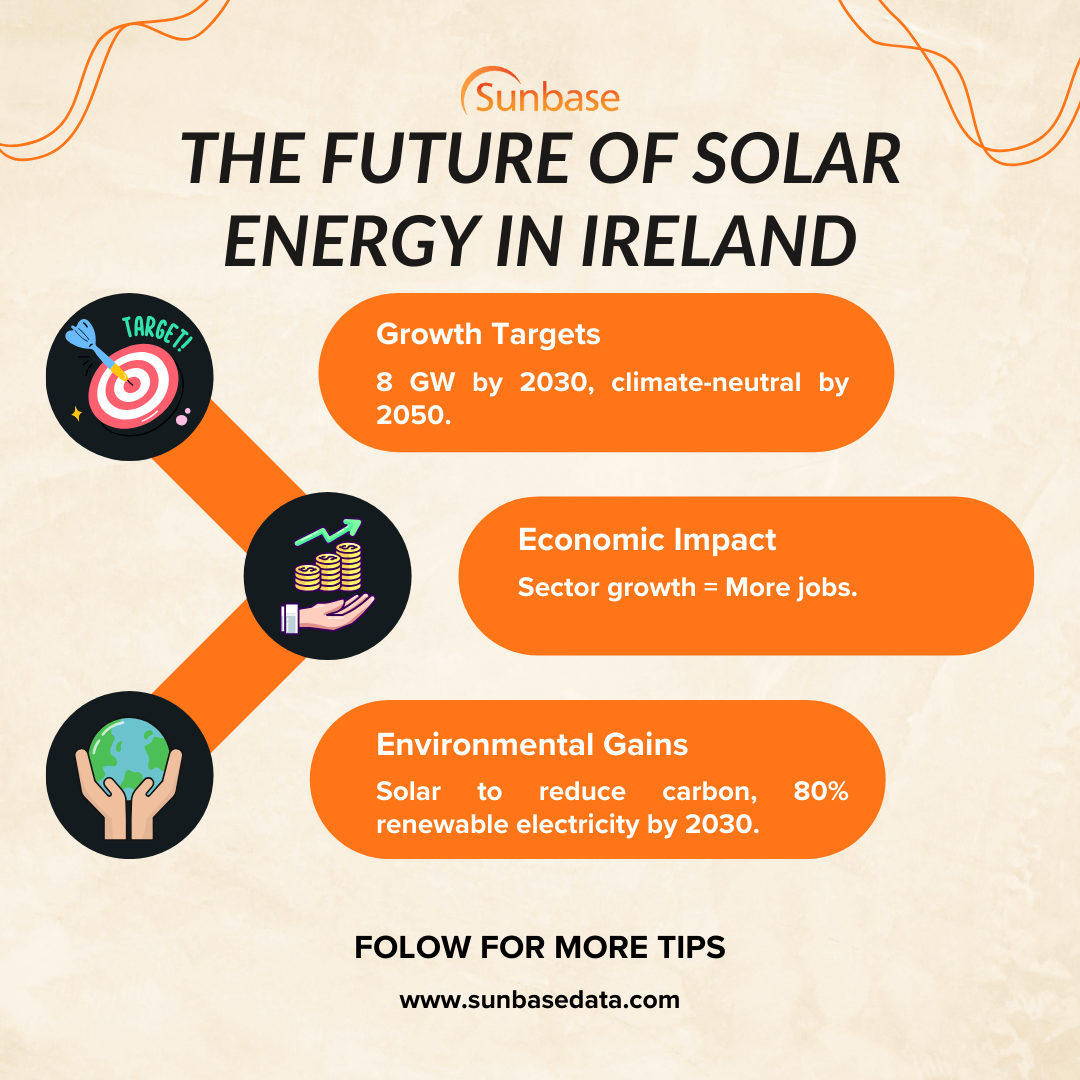
The solar sector in Ireland is rapidly growing, bringing with it a mix of opportunities, achievements, and challenges. Let’s take a look at what the future holds for solar energy in Ireland.
1. Growth Targets:
Ireland has ambitious goals to reach 8 GW of solar capacity by 2030. This target is sparking major investments and growth in the solar sector.
The Climate Action Plan 2024 (CAP24) envisions Ireland as a climate-resilient, biodiversity-rich, and environmentally sustainable nation. The plan aims to achieve a climate-neutral economy by 2050.
2. Economic Impact:
The solar industry is expected to grow significantly, which will create more jobs. Employment in the sector is projected to increase accordingly.
3. Technological Advancements:
Continued innovation in solar technology and energy storage solutions will enhance efficiency and address weather-related challenges, making solar energy more reliable and cost-effective.
4. Environmental Gains:
Solar energy will reduce Ireland's carbon footprint and help the country meet its climate goals. One goal is to generate 80% of electricity from renewable sources by 2030.
Learn More: Emerging Trends in Solar Energy: A Global Perspective
In a Nutshell
Ireland's ambitious sustainable goals position the solar industry for significant growth. It offers both exciting opportunities and challenges.
The Irish Government's inclination towards enhancing solar capacity, supportive schemes, and technological advancements are key factors driving the nation’s green future.
While unpredictable weather and policy inconsistencies seem to be major obstacles to significant renewable electricity generation, innovative solutions, and strategic efforts can overcome these challenges.
Hence, with the right vision and correct actions, 2025 could be a game-changing year for solar energy in Ireland, driving growth, job creation, and environmental benefits.
Know More About Sunbase
Sunbase is ready to help Ireland achieve its renewable energy goals. Discover how Sunbase Solar Software can drive the transition to cleaner and greener energy. Contact us today to learn more!
FAQs
Q1. What is the future of solar power in Ireland?
According to the Sustainable Energy Authority of Ireland (SEAI) report, in May 2024, solar power contributed 10% of Ireland's electricity on a single day, a significant increase from 0% the previous year. Moreover, solar energy is emerging as a promising resource as Ireland aims to generate 80% of its electricity from renewable sources.
Q2. How can micro-generation solar PV systems contribute to Ireland's energy transition?
By installing micro-generation solar panels, households, and small businesses can generate their own electricity. It reduces the burden on centralized power plants.
Q3. How can Ireland protect its solar power from unstable weather?
Ireland can ensure steady solar power generation despite unpredictable weather by adopting hybrid systems, using advanced weather forecasting tools, investing in high-quality solar panels, and properly maintaining them.
I agree to receive marketing messaging from Sunbase at the phone number provided above. I understand data rates will apply, and can reply STOP to OPT OUT.


